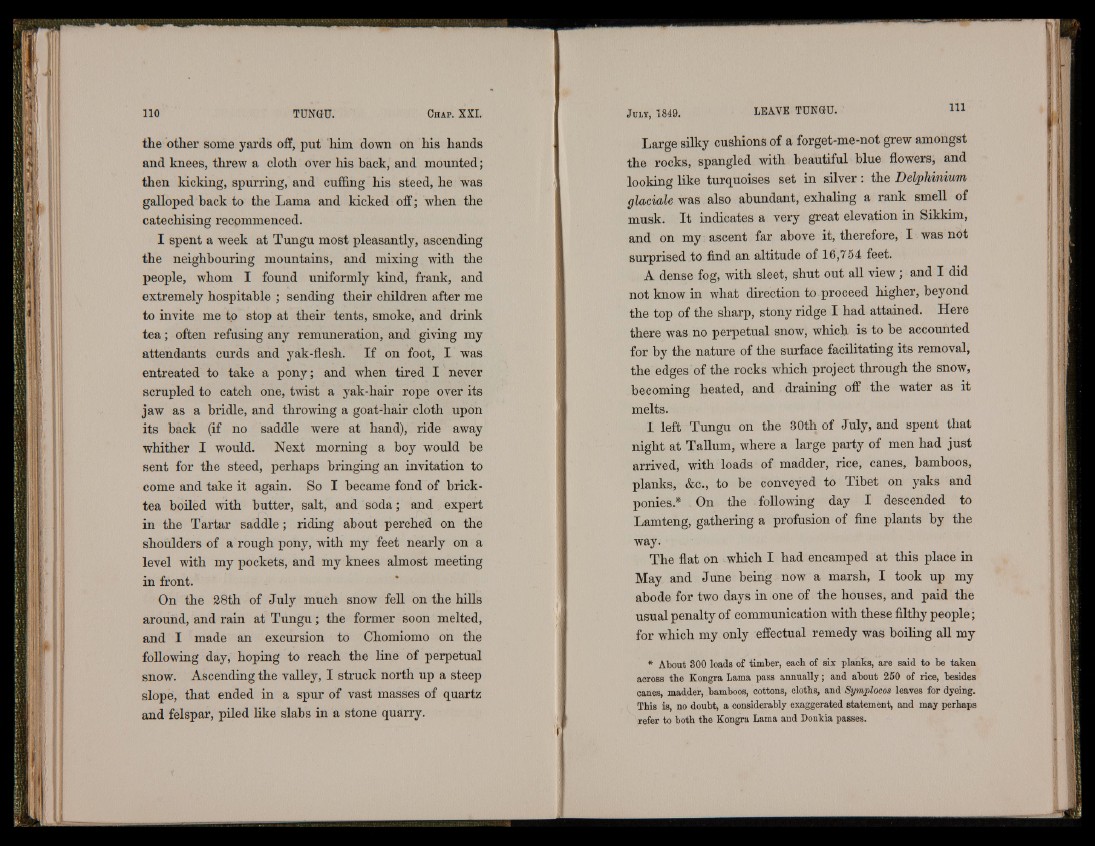
the other some yards off, put him down on his hands
and knees, threw a cloth over his back, and mounted;
then kicking, spurring, and cuffing his steed, he was
galloped hack to the Lama and kicked off; when the
catechising recommenced.
I spent a week at Tungu most pleasantly, ascending
the neighbouring mountains, and mixing with the
people, whom I found uniformly kind, frank, and
extremely hospitable ; sending their children after me
to invite me to stop at their tents, smoke, and drink
te a ; often refusing any remuneration, and giving my
attendants curds and yak-flesh. I f on foot, I was
entreated to take a pony; and when tired I never
scrupled to catch one, twist a yak-hair rope over its
jaw as a bridle, and throwing a goat-hair cloth upon
its back (if no saddle were at hand), ride away
whither I would. Next morning a boy would be
sent for the steed, perhaps bringing an invitation to
come and take it again. So I became fond of brick-
tea boiled with butter, salt, and soda; and expert
in the Tartar saddle; riding about perched on the
shoulders of a rough pony, with my feet nearly on a
level with my pockets, and my knees almost meeting
in front.
On the 28th of July much snow fell on the hills
around, and rain at T u n g u ; the former soon melted,
and I made an excursion to Chomiomo on the
following day, hoping to reach the line of perpetual
snow. Ascending the valley, I struck north up a steep
slope, that ended in a spur of vast masses of quartz
and felspar, piled like slabs in a stone quarry.
Large silky cushions of a forget-me-not grew amongst
the rocks, spangled with beautiful blue flowers, and
looking like turquoises set in silver: the Delphinium
glaciale was also abundant, exhaling a rank smell of
musk. I t indicates a very great elevation in Sikkim,
and on my ascent far above it, therefore, I was not
surprised to find an altitude of 16,754 feet.
A dense fog, with sleet, shut out all view; and I did
not know in what direction to proceed higher, beyond
the top of the sharp, stony ridge I had attained. Here
there was no perpetual snow, which is to be accounted
for by the nature of the surface facilitating its removal,
the edges of the rocks which project through the snow,
becoming heated, and draining off the water as it
melts.
I left Tungu on the 30th of July, and spent that
night at Tallum, where a large party of men had just
arrived, with loads of madder, rice, canes, bamboos,
planks, &c., to be conveyed to Tibet on yaks and
ponies.* On the following day I descended to
Lamteng, gathering a profusion of fine plants by the
way.
The flat on which I had encamped at this place in
May and June being now a marsh, I took up my
abode for two days in one of the houses, and paid the
usual penalty of communication with these filthy people;
for which my only effectual remedy was boiling all my
* About 300 loads of timber, each of six plants, are said to be taken
across the Kongra Lama pass annually; and about 250 of rice, besides
canes, madder, bamboos, cottons, cloths, and Symplocos leaves for dyeing.
This is, no doubt, a considerably exaggerated statement, and may perhaps
refer to both the Kongra Lama and Donkia passes.